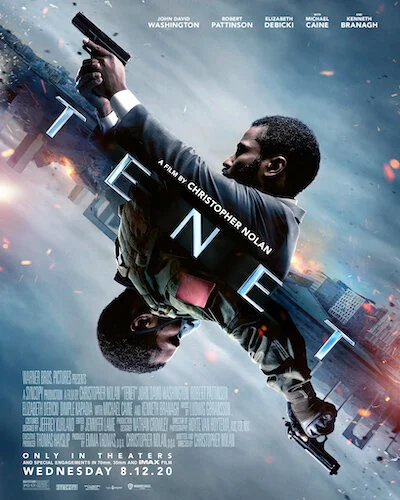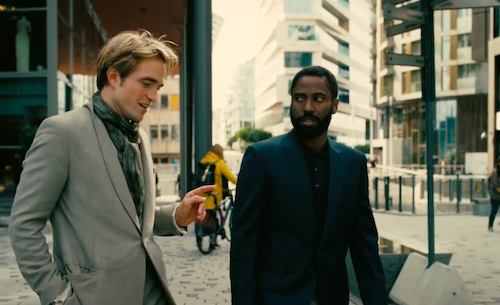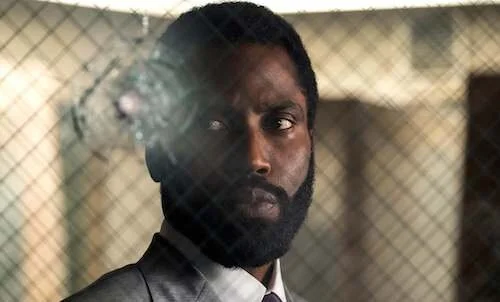Tenet
Well, 2020 has been a disastrous year, as we all know by now. In regards to the movie going experience, theatres — both chains and locals — have taken a massive hit, and are slowly opening back up to the world that might not be ready for this yet health-wise; financially, the world sadly doesn’t have a choice, as many countries are trying to avoid that terrible “d” word that comes after a recession. So, the blockbuster of all blockbusters would be the perfect film to bring cinephiles back into venues again, and the lucky film to be the figurehead of this next plateau in the pandemic era would be at random (given all of the delays). Well, we finally settled on Tenet, and that makes perfect sense given Christopher Nolan’s ability to sell out movie houses, and his means for appealing to the general movie going public and the art film obsessives. Regardless, I think a terrible movie about an anthropomorphic taxidermy trying to get a job as an accountant would bring people in. We need to get out of our homes.
Well, Tenet is a great film to embrace the risky outdoors with (outdoors in 2020 meaning anything outside of your personal bubble, that is), but it’s going to be a work that you will have to marinate on for a very long time. It is by far (by far) Christopher Nolan’s densest film to date, and this is the guy that made Interstellar and Inception that we’re talking about. Usually, Nolan’s films feel more complicated than they really are (Interstellar is a journey that deals with another dimension, and Inception is a heist film that incorporates the subconscious). Tenet is an espionage flick that toys with time, but even its barest structure is complicated this time around, given the common chess moves that a spy film can get lost in. One of Nolan’s vices is getting too involved with exposition and these very chess moves, which can render his characters cold. You can only imagine what that can do with his thickest plot to date.
The protagonist prepping.
Luckily, Nolan is as paradoxical as many of his films are. As cold as his characters can be, Nolan is also great at making any performer truly shine (it’s forever been a strange anomaly, I know). John David Washington is completely magnetic as “the protagonist”, and never once feels monotone (like many cinematic CIA operatives can). Robert Pattinson has delivered us reason number twenty that he is more talented beyond his Twilight-scarred reputation as a quirky, suave agent handler named Neil. Kenneth Branagh seems to be doing his usual theatrical Branagh things when we first hear his thick Russian accent, but he too delivers one of his better performances in years as the main antagonist Andrei Sator; his wife Kat, played by Elizabeth Debicki, is mysteriously distant, and it adds some curiosity to the film’s layers of dog-piled details.
So, the first hour of mostly build up seem okay with the talented players we have to guide us (let’s not forget the other great supporting performers like Bombay legend Dimple Kapadia, Himesh Patel committing to a fairly in depth side role, and Michael Caine being magnetic for the two or so minutes he exists in Tenet). Also, Aaron Taylor-Johnson is uncharacteristically reserved here, and it’s a nice side of him that I wish he’d explore more often. We get a few glances at the film’s time-based shtick early on, and it’s enough to ingratiate audiences if they’re having a tough time to stick around. It’s not Inception exploding diner levels of previewing what’s going to happen, but it’s enough that you’re going to wonder where all of this leads. We get a few action sequences, some more CIA briefing, and suddenly we’re an hour into this thing and questioning where Tenet really is heading.
Neil briefing the protagonist.
And then, Tenet gets there. It’s a breathtaking exposé of technical capability, ranging from astounding special effects to stunning sound design (although I have heard the mix of the film [and not digital] releases for Tenet was rather uneven). Once we’re seeing the breakthrough of Nolan’s flavour-of-the-week mind-bending idea, Tenet is film-of-the-year material: a titanic achievement in captivating cinema. It’s the kind of shift that seems to nullify any qualms I had with the film’s density beforehand, because the final hour of Tenet is must-see cinema in 2020. However, the older I get, the more I’m able to brush off the spectacle that Nolan can create, and see the forest for the trees. Let’s consider this: despite all of the mental gymnastics that Nolan films try to have, there is always some sort of intended emotional revelation. In Memento, it’s realizing that history can be rewritten to cure a guilty conscience. In Inception, there’s the safe space in one’s mind that sometimes overtakes reality. In Dunkirk, we see three timelines converge and then sprawl apart again, depicting the absurdity and grace of fate in fatal situations.
Tenet doesn’t quite have that emotional display. There are subplots that detail small snippets of heart, but otherwise we’re really left fending for ourselves mentally here. Who is the protagonist? How does time work? Why is time a weapon? Is time the only weapon? Who is outplaying who? On one hand, the guessing game in Tenet really makes this film Nolan’s largest puzzle. On the other hand, it comes off as considerably frigid. Maybe not to the point of being unable to like any of the characters when the chips are down, but enough that you might be left connected more with the spectacle than with the players in the story. Toss in an ending that feels like Nolan’s most rushed (even though narratively, everything lines up still), and you have a few blotches in a film that could have easily been the pinnacle moment of 2020’s lineup.
Kat fulfilling her plan.
SPOILERS
We must discuss the manipulation of time, and how that is the ultimate saving grace of Tenet to the point of borderline obliterating so many of the uneasy feelings I had with the plot. I must admit that I am a sucker for a film that provides me with a unique experience, and that can erase some rating deductions I have on my mental notepad while watching. Tenet is one of those Nolan films that goes beyond just having a loopy storyline like Inception or Interstellar. More in the nature of Memento or Dunkirk, Tenet skews film as a linear storytelling mechanism. Memento has two storylines: one forwards and one backwards. Dunkirk has three, and they all occur at different paces. Tenet, like its name, is almost palindromic, with enough of the film occurring forwards and backwards to make this case. When you take into account which moments get revisited in reverse and at what points in the film, that’s when Tenet truly shines. As a narrative, Tenet is a bit difficult. As a film found within the same medium as other works that obey a set of rules built to make up the cinematic language, Tenet is hardly groundbreaking. However, for a mainstream blockbuster, it’s a fantastic experiment that the masses can afford to see more often.
I also love how Tenet doesn’t just deliver its time premise as a means of discussing fate or personal history (although Kat’s storyline is heavily involved with that). In an espionage film, having someone like the protagonist fight themselves because they’ve been conned into doing so is quite a fascinating twist. Via entropic reversal, beings don’t just exist in a different capacity of time, but also on a molecular level, essentially cloning these beings to a degree (once the timelines merge for a brief instance, anyway). Once the protagonist’s mysterious origins gets brought up, we learn that Tenet is a mystery not of the same realm as we are used to. In a sense, Tenet is the brink of the apocalypse, given the urge to prevent World War III, because it is the very end of the world as we know it, and traveling backwards in time is an extension of existence. Preventing this end means that only then can we continue forwards once more. We end off with the realization that futures and histories are one, and the protagonist’s naivety is only the result of him being stuck in a part of his own timeline that he’s not familiar with, despite being the mastermind behind all of these capabilities. It’s too bad that Tenet ends so hastily, because that’s a bit of a realization I’d love to have a few moments to digest in the film’s capacity.
END OF SPOILERS
The protagonist inspecting a suspicious bullethole.
So much works in favour of Tenet. The pitch perfect detail of the special effects. The complexity of the action choreography. We also have Ludwig Göransson’s gorgeous score which is crafted to work forwards and backwards (as parts do play in reverse); he arguably out-Zimmers usual Nolan collaborator Hans Zimmer. The film demands to be seen more than once, given its slow revelations of its true intentions. However, even just by guessing how it’ll go, I’m not sure how much easier all of the setting up will feel, even with the never-ending climax being as earth shattering as it is. On one hand, Tenet is a work I want to visit again and again. On the other, it can feel like eating one of those hamburgers that’s just too big. Sure, you took a bite out of the burger and it all worked out, but is the pleasure feeling a little too strained to enjoy oneself? No one wants fun to feel like a chore.
What helped me compartmentalize Tenet mentally was thinking about where it sits with the other Nolan films in my mind and heart. I wouldn’t place it up there with The Dark Knight, Dunkirk or Memento, but it’s leagues better than the plot hole infested The Dark Knight Rises or the one-time’s-enough The Prestige. In ways, Tenet tried to be the next Inception, with its high stakes, crazy occurrences, and battles of wits, all within a unique reality. It’s actually more like Interstellar at the end of the day: a flawed effort where the brilliance of Nolan’s vision outweighs the issues. Maybe in due time, Tenet will grow on me even more than Interstellar has (I consider the latter to be quite underrated). It’s still a bold effort by Christopher Nolan, and all of the film is magnificent on paper. Some of it feels too ambitious, and the other parts feel exactly how they need to feel. Regardless, Tenet is another fine film in a daring mainstream director’s oeuvre that you can’t go dead wrong with. If this was one of his first works, you’d be wondering where Nolan could go from here. Even still, you can’t predict Tenet entirely, and at least that excitement will tide any viewer over, even if their head hurts a little bit or their heart feels empty.
Andreas Babiolakis has a Masters degree in Film and Photography Preservation and Collections Management from Ryerson University, as well as a Bachelors degree in Cinema Studies from York University. His favourite times of year are the Criterion Collection flash sales and the annual Toronto International Film Festival.









